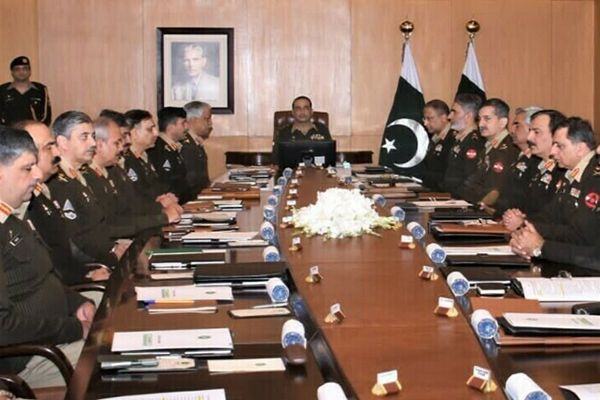For the first time since Pakistan was created three-quarters of a century ago, India is facing a conundrum in its dealings – or absence of dealings, some would qualify – with its western neighbour. It is a conundrum that the government will not openly talk about at this stage: Firstly, because the ball game is still evolving. Secondly, any signal of Indian partisan interest in this evolution can only complicate affairs across the border.
The unthinkable is happening in the Army General Headquarters (GHQ) in Rawalpindi: the Pakistan Army is divided in its political loyalties. For the better part of 76 years, it was Pakistani politicians who have been divided in their loyalties to the Army GHQ. And the GHQ unfailingly picked their favourite politician and installed him or her in office, usually to rescue a Martial-Law-Administrator-turned-President from the hot seat. These roles are likely to be reversed if the ongoing tussle on the streets of Pakistan for control of the country reaches its logical conclusion later this year. It may happen sooner if the streets of Pakistan become bloodied after Nawaz Sharif returns home from Umrah in Saudi Arabia instead of going back to his self-imposed exile in London. It may happen only next year if Sharif is able to – even while being out of any formal office – restore a semblance of normalcy in the life of the aam admi in his country or if simmering differences in the Army are papered over.
Divided Loyalties
The new Army Chief, General Asim Munir Ahmed Shah, will stop at nothing to prevent the hugely popular Imran Khan from returning to elected office in Islamabad. Khan sacked General Munir, as he is commonly known, as Inter-Services Intelligence (ISI) Chief before he completed even one year as spymaster and installed his most loyal General Faiz Hameed, now retired, in that crucial post. In Pakistan, the Chief of the (ISI) always has unfathomable tricks up his uniform, which less wily and conspiratorial Chiefs of Army Staff have to contend with. Despite his retirement, Faiz – as he is best known – commands huge loyalty at the Army GHQ.
After all, as ISI Chief, he won Afghanistan back for Pakistan without firing a shot on India’s Independence Day in 2021, went to Kabul soon after and practically handpicked and installed members of the new Taliban regime that September. Since retirement, Faiz has been helping Khan build his populist mass movement just as he is said to have covertly helped the Pakistan Tehreek-e-Insaf (PTI) leader build up his movement to dislodge Sharif as Prime Minister after the infamous 2016 Panama Papers leak on illegal foreign assets owned by politicians. Because Faiz has a following in the Army ranks, Munir has been viewing the former’s activities with great consternation. The Chief is unable to maintain the disciplined, monolithic atmosphere within the Pakistan Army any longer.
Then there is another General who has become a backroom player, the retired Army Chief Qamar Javed Bajwa. Always suspected, it has now been circumstantially acknowledged that Bajwa was instrumental in regime change in Islamabad last year because, for the most part, Khan had become an insurgent against Pakistan’s benefactors in Washington. After Shehbaz Sharif succeeded Khan, Bajwa is known to have been in constant contact with Nawaz Sharif in London.
Arrogated Guardian
The unprecedented intrigues within the Army – which were always firmly and quickly put down in the past before they drew big attention – do not bode well for India and for the rest of the world. The Army has been Pakistan’s only stable institution since General Ayub Khan – self-appointed Field Marshal in 1965 – seized power 11 years after that country’s formation in a constitutional coup d’état, justified by the Supreme Court under the “Doctrine of Necessity.” Every other institution in Pakistan has been systematically eviscerated and cannot be a reliable interlocutor for India. This applies to Washington as well, although successive administrations in the White House make a pretence of wanting democracy in Islamabad.
Most of Pakistan’s leaders like Benazir Bhutto and Nawaz Sharif had gradually, through trial by fire, been installed in office and also thrown out of office, matured under the Army’s overarching roof as the arrogated guardian of that country’s ultimate self-interest. Khan is yet to reach that level, having been in power just one time. Hillary Clinton, the United States of America’s Secretary of State, famously said: “It is like that old story – you cannot keep snakes in your backyard and expect them to only bite your neighbours. Eventually, those snakes are going to turn on whomever has them in the backyard.” Unlike other Prime Ministers mentored by the Army GHQ, Khan is yet to learn that lesson. Otherwise, he would not have committed the monumental mistake of making peace with the Tehreek-e-Taliban Pakistan (TTP). That fragile peace ended when Khan ceased to be Prime Minister and Faiz retired as ISI Chief. The proverbial snakes have since been turning on those within Pakistan.
But the illusory idea of peace with the TTP has a big following within the Army’s ranks and this school is now ranged against Bajwa’s idea of accommodation with India and engagement of the US. Munir belongs to this camp, so does Nawaz Sharif. If these differences are not reconciled soon and the Army can no longer be the glue holding the country together, there is every possibility that Pakistan could splinter like Yugoslavia. With Pakistan’s secret warehouses full of nuclear weapons, this is not good news for anyone, least of all for neighbour India.

















